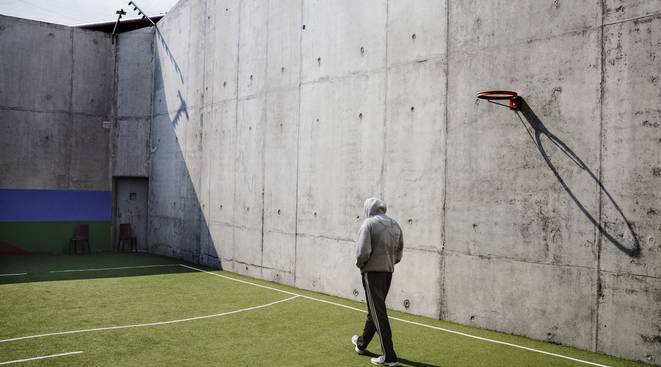
France
Capital city — Paris
Country population
i2020/ INSEEIncarceration rate (per 100,000 inhabit…
Type of government
Human Development Index
Homicide rate (per 100,000 inhabitants)
i2015/ UNDPName of authority in charge of the pris…
Total number of prisoners
60,614Between 16 March…
i06/05/2020/ prison administrationAverage length of imprisonment (in mont…
Prison density
103 %"In the spac…
i2020/ Prison administrationTotal number of prison facilities
i01/01/2018/ Prison adminsitrationAn NPM has been established
Female prisoners
i01/2020/ Prison administrationIncarcerated minors
i01/2020/ Prison administrationPercentage of untried prisoners
i01/2020/ Prison administrationDeath penalty is abolished
yes, since 1981The last executio…
Health
Organisation of health care
Ministry in charge
Ministry of Health
Every prison facility has a health care unit
Access to healthcare is assured in detention by a level 1 medical unit, an internal structure of the affiliate hospital, located in each institution. Services within the scope of general medicine and which do not require hospitalisation are provided there. The availability of medical equipment varies greatly between institutions and include a lack of X-ray or ophthalmology equipment or poor condition of sterilisation supplies. These units are often cramped and barely functional.
Different types of medical care are provided :
- Level 1 care refers to doctor’s visits, external procedures and outpatient care. Medical units, formerly outpatient consultation and treatment units (unités de consultation et de soins ambulatoires (UCSA)), provide consultations and physical examinations pertaining to general practice that do not require hospitalisation. They are found in nearly all prisons and are served by general practitioners and nurses.
- Level 2 care refers to short-term hospitalisation. This allows people to receive comprehensive, individualised, or intensive care and physical examinations during the day. Medical procedures are carried out in hospitals, with psychiatric care provided inside the prisons through the medical units.
- Level 3 care refers to full hospitalisation. Medical care is provided in converted sections in the nearest hospitals (for urgent medical treatment and short-term stays). Long-term admissions (longer than 48 hours) go to specially secured hospital units (unités hospitalières sécurisées interrégionales (UHSI)). Psychiatric hospitalisation is available in specially adapted hospital units (unités hospitalières spécialement aménagées (UHSA)), with or without consent.
Health care has been the responsibility of the public hospital service (Ministry of Health) since the bill of 18 January 1994 was passed. Their organisation is based on two systems: one for physical health care, the other for mental health care.
There were, as of 1 January 2018:
• 1 health unit in each correctional facility (with the exception of day placement centres).
• 9 specially equipped hospital units (UHSA) are located in hospitals. They accommodate psychiatric hospitalisations (with or without consent): Bordeaux, Lille, Lyon, Nancy, Marseille, Orléans, Rennes, Toulouse, Villejuif. These units house a total of 440 beds.
• 8 inter-regional secure hospital units (UHSI) located in university hospital centers (CHU) for scheduled hospitalisations lasting more than 48 hours: Bordeaux, Lille, Lyon, Marseille, Nancy, Paris - La Pitié, Rennes and Toulouse. A total of 181 UHSI beds are available.
• 1 national public health institution in Fresnes.
• 26 Regional mental health services (SMPR) located in 26 prisons.
Access to health care
Health care is free
All care related to illness or pregnancy is covered by the social security system, in the same conditions as on the outside and thus with the same rates of reimbursement. The patient remains responsible for certain health expenses that are not covered by health insurance.
A medical examination is performed upon admission
A first medical visit must take place upon entry into detention in order to ensure continuity of care of those receiving treatment and to identify those who are carriers of contagious diseases or need urgent care. This examination allows for the detection of potential suicide risks and the future monitoring of immunisation status, addiction or mental health disorders.
A medical file is opened upon admission
An epidemiological fact sheet is produced following the medical examination completed upon entry into detention and filed in the medical record.
Prisoners can access health care units after
a written request
Appointment requests are made in writing. Written requests create difficulties for people with low levels of literacy or those have not mastered the French language. The NGO Médecins du Monde tries to make appointment requests more accessible by offering a leaflet on which the inmate ticks boxes according to the treatment needed. Obtaining an appointment can take several months.
Medical examinations are carried out on a confidential basis
no
In order to maintain healthcare confidentiality, prison staff may not be present during consultations. In practice, the layout of the premises and the permanent presence of prison staff do not always allow the proper respect of healthcare and doctor-patient confidentiality. Breach of confidentiality is often reported as one of the most significant barriers to access to care.
Access to medical units is uneven across facilities. On the whole, access to general medical care is satisfactory, although subject to the constraints of the institutions (activities on the same schedule, ongoing disciplinary procedures, etc.). There are serious shortcomings in specialised care, particularly ophthalmological and dental care, and care for chronic conditions. There are not enough specialist doctors. In certain situations, particularly in the disciplinary unit or in the event of medical extraction, the consultation conditions can be problematic. In particular, there is a lack of respect for medical confidentiality and the quality of care.